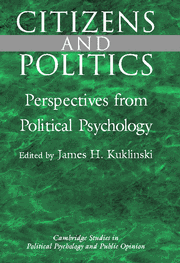Book contents
- Frontmatter
- Contents
- List of Contributors
- Prologue: Political Psychology and the Study of Citizens and Politics
- PART I AFFECT AND EMOTIONS
- PART II POLITICAL COGNITION
- Introduction
- 5 An Experimental Study of Information Search, Memory, and Decision Making During a Political Campaign
- 6 Political Accounts and Attribution Processes
- 7 The Motivated Construction of Political Judgments
- 8 Commentary: On the Dynamic and Goal-Oriented Nature of (Candidate) Evaluations
- PART III POLITICAL ATTITUDES AND PERCEPTIONS
- PART IV POLITICAL VALUES
- Index
- Titles in the series
Introduction
Published online by Cambridge University Press: 07 October 2011
- Frontmatter
- Contents
- List of Contributors
- Prologue: Political Psychology and the Study of Citizens and Politics
- PART I AFFECT AND EMOTIONS
- PART II POLITICAL COGNITION
- Introduction
- 5 An Experimental Study of Information Search, Memory, and Decision Making During a Political Campaign
- 6 Political Accounts and Attribution Processes
- 7 The Motivated Construction of Political Judgments
- 8 Commentary: On the Dynamic and Goal-Oriented Nature of (Candidate) Evaluations
- PART III POLITICAL ATTITUDES AND PERCEPTIONS
- PART IV POLITICAL VALUES
- Index
- Titles in the series
Summary
Until the last decade, just about everything we knew about how citizens reach political decisions came from traditional surveys, predominantly the National Election Studies (NES). The NES set the framework for research on public opinion and voting behavior and literally monopolized the research questions scholars asked. Two studies in particular, The American Voter and Converse's “The Nature of Mass Belief Systems,” set the groundwork for the next three decades of political inquiry.
The well-known conclusions derived from this genre of research have not been particularly uplifting for advocates of democracy. With few exceptions, studies consistently reveal a highly uninformed citizenry.
The survey research that began in the early 1960s and still thrives today has four distinctive characteristics. First, the analysis almost always takes the form of identifying statistical associations among variables. With the passage of time, the statistical models have become more and more sophisticated, but the underlying logic of correlating variables has remained the same. Second, despite the frequent use of terminology to the contrary, this research does not examine the processes by which people make political decisions. Survey data simply are not well suited to exploring decision-making dynamics. This is self-evidently true when the data are cross-sectional, but panel studies suffer similar limitations. Identifying structural relationships among variables collected at one point in time or, at best, at two or three points in time falls far short of probing actual thought processes.
- Type
- Chapter
- Information
- Citizens and PoliticsPerspectives from Political Psychology, pp. 127 - 135Publisher: Cambridge University PressPrint publication year: 2001
- 2
- Cited by



